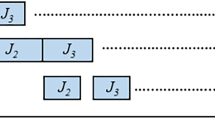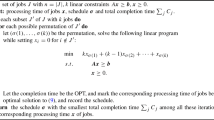Abstract
It is well-known that the classical Johnson’s Rule leads to optimal schedules on a two-stage flowshop. However, it is still unclear how Johnson’s Rule would help in approximation algorithms for scheduling an arbitrary number of parallel two-stage flowshops with the objective of minimizing the makespan. Thus within the paper, we study the problem and propose a new efficient algorithm that incorporates Johnson’s Rule applied on each individual flowshop with a carefully designed job assignment process to flowshops. The algorithm is successfully shown to have a runtime \(O(n \log n)\) and an approximation ratio 7/3, where n is the number of jobs. Compared with the recent PTAS result for the problem (Dong et al. in Eur J Oper Res 218(1):16–24, 2020), our algorithm has a larger approximation ratio, but it is more efficient in practice from the perspective of runtime.








Similar content being viewed by others
Data Availability
The manuscript has no associated data.
References
Artiba A, Tahon C (1992) Production planning knowledge-based system for pharmaceutical manufacturing lines. Eur J Oper Res 61(1–2):18–29
Blazewicz J, Ecker KH, Schmidt G, Weglarz J (2012) Scheduling in computer and manufacturing systems. Springer, Berlin
Chen J, Huang M, Guo Y (2022) Scheduling multiple two-stage fowshops with a deadline. Theor Comput Sci 921:100–111
Dong J, Tong W, Luo T, Wang X, Hu J, Xu Y, Lin G (2017a) An FPTAS for the parallel two-stage flowshop problem. Theor Comput Sci 657:64–72
Dong J, Hu J, Kovalyov M, Lin G, Luo T, Tong W, Wang X, Xu Y (2017b) Corrigendum to An FPTAS for the parallel two-stage flowshop problem. Theor Comput Sci 687:93–94
Dong J, Jin R, Luo T, Tong W (2020) A polynomial-time approximation scheme for an arbitrary number of parallel two-stage flow-shops. Eur J Oper Res 218(1):16–24
Garey MR, Johnson DS (1979) Computers and intractability: a guide to the theory of NP-completeness. W. H. Freeman and Company, New York
Graham RL (1966) Bounds for certain multiprocessing anomalies. Bell Labs Tech J 45(9):1563–1581
Graham RL (1969) Bounds on multiprocessing timing anomalies. SIAM J Appl Math 17(2):416–429
Graham RL, Lawler EL, Lenstra JK, Kan AR (1979) Optimization and approximation in deterministic sequencing and scheduling: a survey. Ann Discrete Math 5:287–326
He DW, Kusiak A, Artiba A (1996) A scheduling problem in glass manufacturing. IIE Trans 28(2):129–139
Hochbaum DS, Shmoys DB (1987) Using dual approximation algorithms for scheduling problems: theoretical and practical results. J ACM 34(1):144–162
Johnson SM (1954) Optimal two- and three-stage production schedules with setup times included. Naval Res Logist Q 1(1):61–68
Kovalyov MY (1985) Efficient epsilon-approximation algorithm for minimizing the makespan in a parallel two-stage system. Vesti Academii navuk Belaruskai SSR Ser Phiz-Mat Navuk 3:119 (in Russian)
Ruiz R, Maroto C (2005) A comprehensive review and evaluation of permutation flowshop heuristics. Eur J Oper Res 165(2):479–494
Schuurman P, Woeginger GJ (2000) A polynomial time approximation scheme for the two-stage multiprocessor flow shop problem. Theor Comput Sci 237:105–122
Tong W, Xu Y, Zhang H (2022) A polynomial-time approximation scheme for parallel two-stage flowshops under makespan constraint. Theor Comput Sci 922:438–446
Vairaktarakis G, Elhafsi M (2000) The use of flowlines to simplify routing complexity in two-stage flowshops. IIE Trans 32(8):687–699
Wu G, Chen J, Wang J (2019a) Scheduling two-stage jobs on multiple flowshops. Theor Comput Sci 776:117–124
Wu G, Chen J, Wang J (2019b) On scheduling inclined jobs on multiple two-stage flowshops. Theor Comput Sci 786:67–77
Wu G, Chen J, Wang J (2020a) On scheduling multiple two-stage flowshops. Theor Comput Sci 818:74–82
Wu G, Chen J, Wang J (2020b) Improved approximation algorithms for two-stage flowshops scheduling problem. Theor Comput Sci 806:509–515
Zhang X, van de Velde S (2012) Approximation algorithms for the parallel flow shop problem. Eur J Oper Res 216(3):544–552
Zhang Y, Zhou Y (2012) TransOS: a transparent computing-based operating system for the cloud. Int J Cloud Comput 4(1):287–301
Funding
This work is supported by the National Natural Science Foundation of China under Grants 62072476; Natural Science Foundation of Hunan Province under Grant 2020JJ4949 and 2021JJ40791; Excellent Youth Project of Scientific Research of Hunan Provincial Education Department under Grant 19B604; the Open Project of Xiangjiang Laboratory (No. 22XJ03005).
Author information
Authors and Affiliations
Contributions
The authors participated in the preparation and presentation of the manuscript.
Corresponding author
Ethics declarations
Conflict of interest
The authors have no relevant financial or non-financial interests to disclose.
Additional information
Publisher's Note
Springer Nature remains neutral with regard to jurisdictional claims in published maps and institutional affiliations.
A preliminary version of this paper has appeared in Proceedings of the International Joint Conference on Theoretical Computer Science-Frontier of Algorithmic Wisdom (IJTCS-FAW), 2023, pp. 212–224.
Rights and permissions
Springer Nature or its licensor (e.g. a society or other partner) holds exclusive rights to this article under a publishing agreement with the author(s) or other rightsholder(s); author self-archiving of the accepted manuscript version of this article is solely governed by the terms of such publishing agreement and applicable law.
About this article
Cite this article
Wu, G., Zuo, F., Shi, F. et al. On scheduling multiple parallel two-stage flowshops with Johnson’s Rule. J Comb Optim 47, 12 (2024). https://doi.org/10.1007/s10878-024-01107-z
Accepted:
Published:
DOI: https://doi.org/10.1007/s10878-024-01107-z




